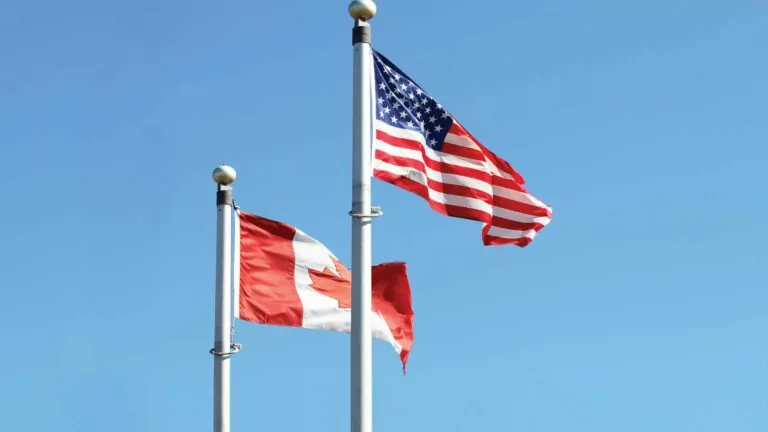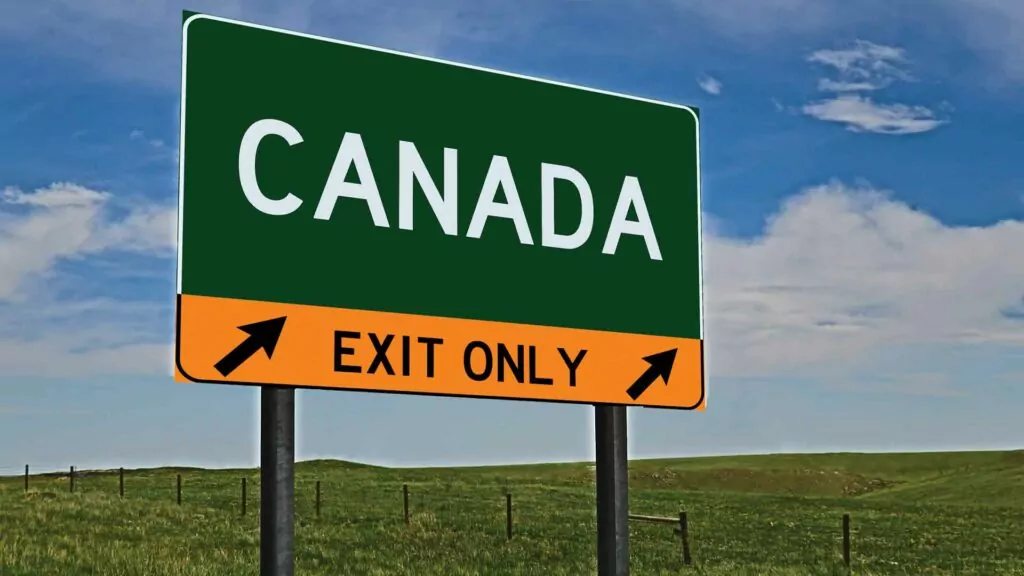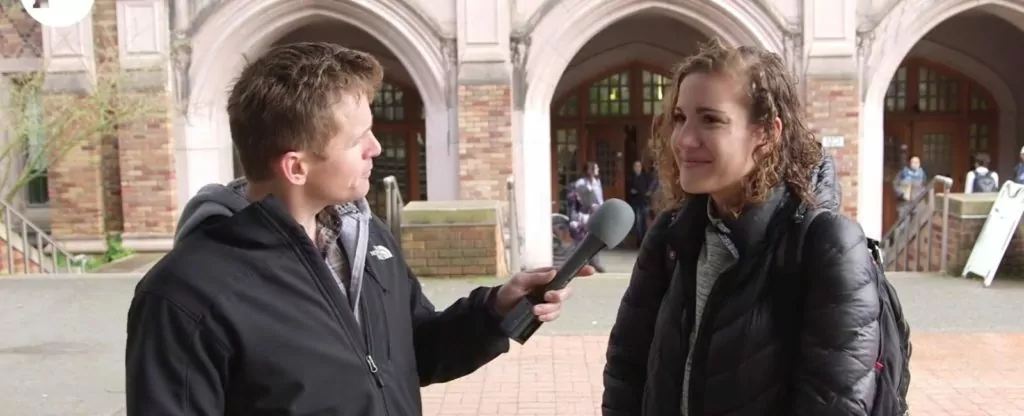“Give me your tired, your poor, your huddled masses yearning to breathe free, the wretched refuse of your teeming shore.”
These words are engraved on the base of the Statue of Liberty in New York Harbor, calling out to countless immigrants to America, who were longing for freedom from persecution, from poverty, from overcrowding, from a restricted way of life.
These words, when written in 1883, were mostly aimed at citizens of the “Old World,” but lately more Canadians are hearing the call of “Lady Liberty,” and wondering if life would be better south of the 49th parallel. Are Americans really freer than Canadians? What would our lives be like if we moved to the USA?
I would like to make clear that I’m not entirely unbiased. I’m proud of my Canadian heritage, and I love Canada, but my wife Faith and I moved from B.C. to the U.S.A. in 1996, first to Blue Bell, Pennsylvania, and later to Lynden, Washington, where we have lived since 2002. We love the U.S. but we also recognize that there are many things about moving that should be considered carefully before making a momentous decision that will have generational consequences. I hope that this article may give good food for thought to RP readers who are thinking about pulling up stakes, or who know others who are considering such a move.
Freedom
Both countries’ national anthems espouse freedom: America is “the land of the free, and the home of the brave,” while Canada is “The True North, strong and free.” As a test case, the COVID restrictions and lockdowns of 2020-2021 are a fascinating study in how much freedom was or wasn’t prized, with all the different policies that were implemented in the hopes of saving lives.
In general, Canadian provinces locked down more tightly and for a longer time than most American states. Bryan Grim and his wife Leanne moved to Sioux Falls, South Dakota this past summer from Surrey, B.C. with their seven children. Bryan recalled that in B.C. for long stretches, they were restricted in their movements within the province, forbidden to travel between arbitrarily designated zones.
Travel restrictions were tough, but having “in-person” worship services forbidden was another matter entirely. For many months, most Canadian churches did not gather together for worship in their church buildings, but resorted to live streaming of a pastor preaching to a mostly empty church. As these restrictions stretched on, church members debated and argued over whether or not they should defy the shutdown orders, or reluctantly obey. Church councils across the country had to deal with division among office bearers and among the members, and in some cases these wounds are still healing.
In the U.S., with fifty different governors, and fifty different legislatures, there were many different responses to COVID. Some more rural and conservative states (including Arkansas, Iowa, Nebraska, the Dakotas, Utah, and Wyoming) had very few state-wide restrictions, and no enforced “stay at home” orders. Other states like Arizona, Florida, Tennessee and Texas opened up to regular commerce, worship services, and in-person education much more quickly than more left-leaning states like California, New York, and Washington. One common pattern in both countries is that most big cities were tougher on lockdowns: whether you lived in Los Angeles or Toronto, at times you would have felt very restricted.
In more rural parts of both countries, there may have been more lenience by police forces and local governments. In my adopted home town of Lynden, the local police and the county sheriff’s department did not enforce any of the state governor’s directives restricting worship services, and local mayors and elected officials encouraged churches to use common sense in deciding whether or not, and how, to hold in-person worship services. Many of the “lesser magistrates” in different parts of the USA recognized the vital (literally, life-giving) importance of worship services to the lives of a free people, upholding the First Amendment of the Constitution that states: “Congress shall make no law respecting an establishment of religion, or prohibiting the free exercise thereof…”
RP readers may be aware of areas in Canada where overly burdensome regulations from provincial or national governments were not enforced by local governments, but it’s safe to say that these cases were few and far between.
Canadians are by and large brought up to respect those in authority over us, and most Canadian Christians can quote from Romans 13 by heart: “Let every person be subject to the governing authorities. For there is no authority except from God, and those that exist have been instituted by God…” Americans, of course, have the same Bible! But somehow, there is a spirit of independence among citizens of the U.S. that pushes back strongly against any authority that is deemed to have over-reached its powers as granted in national or state constitutions. Americans rebelled against what they judged to be the unlawful and unjust authority of King George III in 1776; many who were loyal to the British crown and did not believe rebellion was the proper path left the country and moved to Canada.
Are Americans more free than Canadians? That likely depends greatly on the state or province in which you hang your hat, and on the size of the city you have made your home. But the spirit of independence of citizens, and their desire to curtail government powers to those specifically granted by constitutions does seem to be more alive in most of the fifty states than in the provinces and territories.
Drifting in the same direction?
The Canadian Charter of Rights guarantees fundamental freedoms such as “freedom of religion, freedom of thought, freedom of belief, and freedom of expression.” Yet many Canadians are angry about the government’s power being directed against them when they exercise these freedoms, and call homosexuality a sin against God, or when they speak out against government policies they judge to be unjust. (Some truckers who spoke out against the COVID lockdowns found themselves frozen out of their bank accounts!)
But how different are things in the U.S.?
The recent mid-term elections in the U.S. were disappointing for many American Christians. If the exit polling is accurate, millions of voters were swayed by pro-abortion advocates to keep the Democrat party in control of the Senate. Conservatives had hoped that the leftward drift of the country would be rejected by its citizenry. Instead, the voters appeared to endorse the leadership of President Biden, who despite his Roman Catholic faith, has embraced abortion as a “reproductive right.” Self-identified independents who can sway election results for either side mostly voted for the Democratic candidates: in particular younger, female voters helped push results in favor of the more liberal of the country’s two major political parties. (The Republican party did gain control of the House of Representatives, but with a far slimmer margin than pollsters had predicted.)
One election does not necessarily indicate a permanent shift, but Canadians who wish to escape liberal trends in government might pause to look carefully at directions in the United States.
Church communities
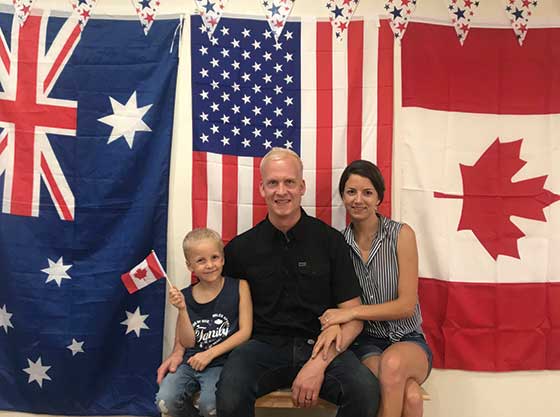
Nate and Victoria and their son Jaxon – show off some of their geographical connections, sitting in front of the US, Canadian, and Australia flags.
A generation or two ago, many Reformed people would narrow down the locations that they’d be willing to move, to areas where they could find a church from within their own federation, or one that was already recognized as a “sister church.”
There is definitely some safety and wisdom in this approach: if we move for greater economic opportunities, or political freedom, but compromise in our choice of which church to join, we may live to regret that decision.
Nate and Victoria VanAndel recently moved to Maryville, Tennessee from Brantford, Ontario with their son Jaxon. The VanAndels were grateful for the ability to watch recorded worship services from churches they were considering; it helped them make their decision to join Sandy Springs Orthodox Presbyterian Church (OPC) near Knoxville after also visiting some local congregations of the Presbyterian Church in America (PCA). “Sundays include a pre-service Sunday school in the morning, a bi-monthly potluck lunch, and an evening service,” said Victoria. “We have found this church to be very inviting, and we felt at home here very quickly.” (The OPC is in a fraternal relationship with both the URC and CanRC federations; the PCA is recognized within NAPARC as a faithful church body.)
Canadians who have been members of long-established Reformed churches back at home may be surprised by how small many of the conservative Presbyterian or Reformed churches are in the USA, particularly in areas where there has not been a large Dutch immigrant community. For example, the OPC has an average congregational size of 110 members. Smaller churches can have many benefits, with greater opportunity for strong relationships between members, and community involvement, but some of the resources of a larger church community may not be present.
Christian schooling
Bryan Grim found this to be the case in particular with regard to Christian education. Grim grew up in the Fraser Valley of B.C., and appreciates the schools founded by Canadian Reformed people in the 1950s, with many United Reformed members also joining these school societies in the last twenty years. Grim stated that the local Christian school society in Sioux Falls appears to have drifted from its Reformed roots, and not many members of his new home church, Christ Reformed URC, send their children there (although Bryan and Leanne’s children are attending).
More parents have chosen to homeschool their students, rather than worry about what the young people are taught when away from the home. This appears to be a more common trend in long established American Christian school societies in Reformed communities, which after a period of years, drop their requirements that teachers and leaders adhere to the Reformed confessions and maintain membership in a faithful church body. How the parents and educators who worked so hard to establish these schools would lament these developments!
How about our grandparents?
Those in favor of moving out of Canada might point to their grandparents or great grandparents, many of whom moved away from the Netherlands without having issues of church membership or schooling finally settled. No doubt, many of the Dutch who left Holland had not thought through every detail of family and church life, but judged that greater opportunity in Canada, and further distance from European wars and struggles made the risk a responsible one.
In the rear-view mirror, they may judge that they made the right decision, that they by and large were able to establish strong, faithful churches, schools, and communities, and leave behind a country that had much less opportunity for the average citizen. This did not come easily, however, and these older generations had difficult years and struggles along the way. The Lord blessed His people as they worked faithfully wherever He placed them.
Affordability
In the last thirty years, real estate prices in Canadian cities have increased by leaps and bounds. In southern Ontario, in B.C.’s Fraser Valley, and in the larger prairie cities, young people may have a very hard time buying their own home. Research firm Oxford Economics recently reported that overall Canadian real estate prices rose 331% from 1990 through today. The report sounded an alarm that with rising interest rates, many Canadians would have difficulties making their mortgage payments.
The study also reported that real estate had risen 289% during the same time period in the USA, which sounds like a similar rise in value, but as any realtor will say, all real estate is local, and the top three factors in a home’s value are “location, location, location!” Home prices in rural American states remain much more affordable for the average wage-earner.
Bryan and Leanne Grim were able to buy a home on a four-acre property that would be far out of reach for the average buyer if that home were located in Surrey or Mississauga or Los Angeles. In addition, mortgage rates in the U.S. can be locked in for up to thirty years, giving cost certainty for buyers who can be confident that their payments will remain constant as long as they stay in the same home.
With housing prices so high in the lower B.C. mainland, Bryan believed his children would likely have had to move away to become homeowners. By moving to Sioux Falls, he and Leanne have a greater chance that as their children grow up and form their own households, these might be near Dad and Mom.
So far, the Grims have found the cost of living in Sioux Falls to be significantly less than in B.C. with the exception of Christian schooling. Many Christian school societies in Canada charge at a discounted rate for large families, while these discounts might be smaller or non existent in the more typical American Christian school system.
Federal tax rates are substantially lower in the U.S. than in Canada, and there are nine states (Alaska, Florida, Nevada, New Hampshire, South Dakota, Tennessee, Texas and Washington) that have no state-level income tax at all. Michigan, with an abundance of Reformed churches, has the fourth lowest cost of living of the fifty states, and is among the most affordable for housing costs.
Family and friends
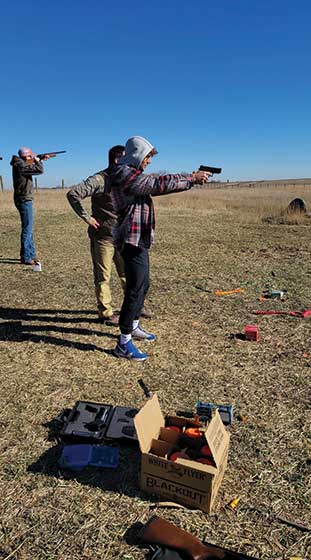
Adam, the oldest son of Bryan and Leanne Grim children, shown exercising his American “right to bear arms.”
Emigrants inevitably leave behind precious loved ones in their family circle – parents, siblings, cousins, extended church family, and friends.
When four of Gary and Cindy Wieske’s six grown children began to move south, one by one, it made the decision to pursue a move themselves easier. Daughter Jodi was already settled in suburban Chicago with her husband. Son Caleb, an entrepreneur like his dad, had always wanted to move to the States, and eventually chose Tennessee as his destination, where he and his brother Dustin have started an outdoor living company, supplying patio furniture, barbecues, smokers, and similar products.
As owners of Ontario Stone Supply in Dundas, Gary and Cindy Wieske were able to buy a similar company in Fort Myers, Florida, where they moved along with son Rodney and his family: Rodney is manager of the new location in Fort Myers, while son Luke and daughter Nadia are running the company back home in Ontario. Gary Wieske is thankful to be able to travel to see his kids and grandkids in Florida, Tennessee, Illinois and southern Ontario.
In South Dakota, Bryan and Leanne Grim are also glad that Bryan’s sister and her family moved to the same neighborhood, giving all the children the benefit of having cousins and friends nearby.
Most of those who move, however, will not have the benefit of frequent in-person contact with extended family and long-time friends. While staying connected through phone and internet is easier and more affordable now than it’s ever been, it isn’t the same as in-person visits or catching up over a cup of coffee. In particular, parents with young families may find it hard to be away from the network of babysitting grandparents, and friends ready to pitch in at a moment’s notice.
Can you do it?
There are a number of possible legal paths that Canadians can consider for a move to the U.S. Many American companies are looking for professionally qualified employees in diverse fields, and may be able to help with the immigration procedure. Investors’ visas are another common route: they do require a good amount of capital, a good business plan, and a lot of paperwork to qualify, but the route is a well-trodden one.
It is possible to take care of the paperwork and filing to immigrate without a lawyer but it may be a much more frustrating and time-consuming endeavor. Everyone I spoke to for this article mentioned the value of a good immigration attorney. “They give you the confidence that you can do it,” said Gary Wieske. “Although there is still a lot of planning, and a lot of paperwork and charts.”
In general, immigration attorneys know their business and are able to find the most expeditious path to a visa, including advice on which visas can lead to eventual permanent residence status (also known as a “green card”). It may be wise to find a lawyer who you know has been able to help other Canadians make the move legally: in our Lynden community, we could readily recommend which lawyers have been excellent, and which may not have quite as sterling a reputation.
Should you do it?
When asked, “Why make the move?” Gary Wieske quoted his son Dustin: “For faith, for family, and for freedom: if that’s what we’re doing it for, then we’ll be blessed.” So far, Wieske has no regrets: his family appreciates living among so many more outspoken Christians than back home. He recalls the simple gesture of a waitress in a Tennessee restaurant who reminded Wieske’s grandkids to pray for their meal: “That’s something I’ve never seen in all my years in Ontario!”
For Bryan Grim and his family, the move has so far been all very positive: he appreciates that South Dakotans value their freedom, and, in particular, their freedom of expression. Grim finds that folks in his relatively small town are tolerant of other viewpoints: “In South Dakota, you’re still allowed to have your own opinion.”
While Victoria VanAndel misses family back in Ontario, she instantly felt at home in the south: “The first week here in Tennessee I remember saying to Nate that I had such nice people serve me at the grocery store, and wherever I had to run errands that day. After a week of this though it became clear that the people are just friendlier and happier here! We had neighbors welcome us with baskets of veggies, porch flowers and a kind word of ‘welcome to Tennessee, this here is God’s country!”
Whether or not a move out of your community is right for you and your family is really a question that you can only answer yourself. As has been discussed, there are many factors to consider. God has called us to live faithfully before Him as prophets confessing His name, as priests presenting ourselves as living sacrifices to Him, and as kings fighting against sin and the devil, and we may and must do all these things wherever we find ourselves living on this earth.
As we consider our roles as members of God’s Church, as parents, as children, as employees, and as citizens, let us use wisdom from God’s word, listen to good counsel from those we respect, and pray to the Lord for guidance in these decisions.
Marty VanDriel is the Assistant Editor of Reformed Perspective.







